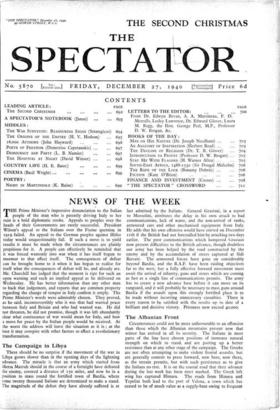The Campaign in Libya
There should be no surprise if the movement of the war in Libya grows slower than in the opening days of the lightning advance. The miracle is that an army which started from Mersa Matruh should in the course of a fortnight have defeated the enemy, covered a distance of iso miles, and now be in a position to mass round the fortified town of Bardia, where some twenty thousand Italians are determined to make a stand. The magnitude of the defeat they have already suffered is at last admitted by the Italians. General Graziani, in a report to Mussolini, attributes the delay in his own attack to bad communications, lack of water, and the non-arrival of tanks, armoured cars and other mechanised equipment from Italy. He adds that his own offensive would have started on December rth if the British had not forestalled him by attacking two days earlier. The poor communications which hampered Graziani now present difficulties to the British advance, though doubtless our army has been helped by the road constructed by the enemy and by the accumulation of stores captured at Sidi Barrani. The armoured forces have gone on considerably beyond Bardia, and the R.A.F. have been raiding objectives far to the west; but a fully effective forward movement must await the arrival of infantry, guns and stores which are coming as fast as a single line of communications permits. The army has to create a new advance base before it can move on its vanguard, and it will probably be necessary to mass guns around Bardia if the assault upon this strongly fortified place is to be made without incurring unnecessary casualties. There is every reason to be satisfied with the results up to date of a brilliant and decisive victory. Prisoners now exceed 40,000.


























